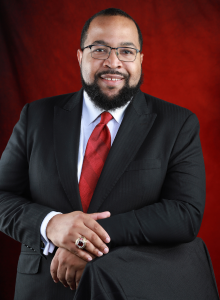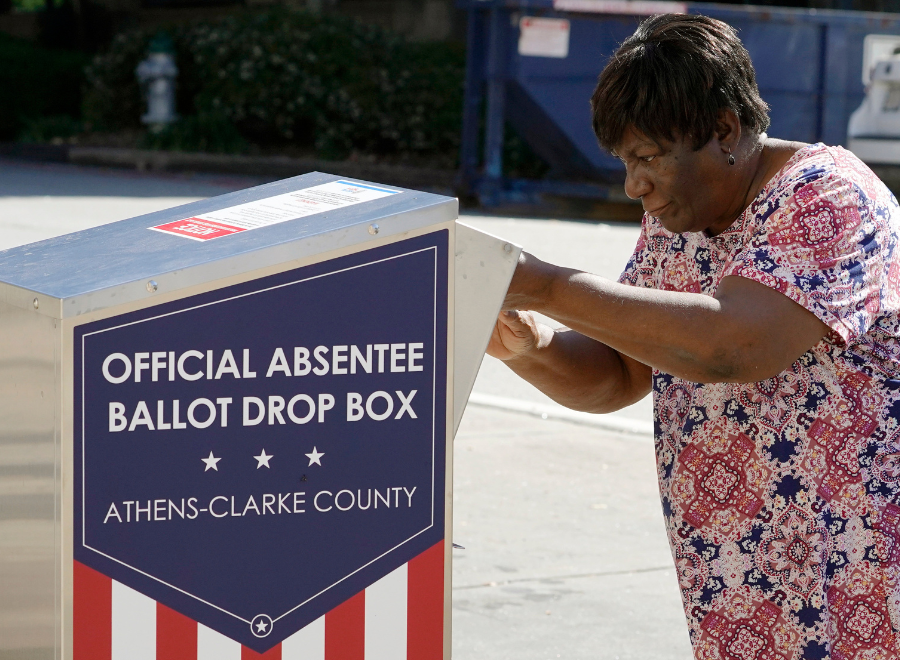On Sunday, two days before the 2024 U.S. general election, I attended my local church, Mother Emanuel AME in Charleston, S.C., a church in a “red state” and one of U.S. President Joe Biden’s first campaign stops in January. Mother Emanuel is also the church where nine people were killed by a white nationalist during a Bible study in 2015.
Holy Communion was observed, and freshly pressed white paraments adorned the pulpit and the altar. Rev. Eric Manning reminded the congregation that the office would be closed on Tuesday and that members needed to be vigilant of their safety on voting day — a sign of the polarized times. In his sermon, Manning chose the topic, “One Hope, One Blood in Jesus Name” from Ephesians 4:4. In his message, he criticized the use of hateful rhetoric at the Madison Square Garden campaign rally and how certain conservative preachers have demonized Vice-President Kamala Harris—to the point of calling her the Antichrist. At the apex of his message, Manning proclaimed, “Jesus makes us great, and He’s the only one who can bring us together.”
You may unsubscribe from any of our newsletters at any time.
As I left the church and opened my program, I spotted a notice placed in the bulletin to encourage us to vote. While the church is officially non-partisan, I couldn’t help but smile when I saw Vice-President Harris’s face among the collage of images in this announcement (the Republican nominee was not included).
That’s the way it is in the Black Church.
On the eve of the most consequential election in the history of the United States in generations, I am seeing canonical knowledge on American democracy and statecraft being rewritten right before my eyes in some perplexing and astounding ways. As a Christian who worships in an historically Black denomination, I am deeply troubled at how faith has been twisted and abused by white Christian nationalism.

The “Black Church” in the United States is composed of several denominations founded by African American Christians in the 19th and 20th century in the Baptist, Methodist and Pentecostal traditions as well as majority-Black congregations in majority-white denominations such as the Episcopal Church, the Presbyterian Church, the Roman Catholic Church and others. Though separated by polity and other sectarian idiosyncrasies, Black churches share common styles of worship, music and community engagement.
My denomination, the African Methodist Episcopal Church, is the oldest major historically Black denomination. It was founded in 1787, when our founder, Bishop Richard Allen, led a walkout from St. George’s Methodist Episcopal Church after being forcibly removed from the altar by white ushers during morning prayer. After the American Civil War, the AME Church — through its missionary work with the newly freed enslaved persons in the South — incubated Black political power and educational endeavours. At the height of colonialism in the 19th and 20th centuries, Black ministers in the Caribbean and Africa sought to join the AME Church as a beacon of freedom from imperial oppression. This legacy continues to this day.
More on Broadview:
- Why white evangelical voters back Trump
- Omer Aziz on the alarming rise of modern fascism in Canada
- Decades after these Black neighbourhoods were destroyed, community organizers meet to talk about their futures
In the 2024 U.S. election, the Black Church received its share of the media spotlight. Vice-President Harris’s faith has become a centrepiece of her campaign, and she frequently reaches out to Black pastors and faith leaders for engagement and support. Within the AME Church, a denominational voter engagement plan called “V-Alert” provides guidance and resources to our approximately 4000 congregations in 39 states with a particular focus on swing states—those whose votes will be decisive in this presidential election. We even ask our congregations to report on the number of registered voters annually as a testament to our belief that Christians have a duty to participate in public affairs. AME Bishop Reginald T. Jackson, who gained widespread acclaim for increasing African American turnout in the 2020 elections by mobilizing Black churches in Georgia, continues to be a nationally respected voice advocating for Black faith-based turnout.
Despite this glorious legacy of working for Black political empowerment, the Black Church is facing its own challenges. Waning church attendance, gentrification, patriarchy, homophobia and outmoded business practices all play a role in its decline. While the Black Church is still a galvanizing and pivotal force for African American political power, to maintain its relevance, these issues must be addressed and resolved.
Furthermore, American Christianity as a whole is in crisis, as white Christian nationalism has taken over the Republican Party leading to hateful, mean-spirited and ungodly rhetoric all in the name of creating a distorted religion that I believe Jesus of Nazareth would not recognize. At the same time, the open racism expressed throughout this election campaign is sadly unsurprising. The AME Church has been dealing with anti-Black racism since its founding. The memorial next to our building that is being constructed for the nine martyrs who were murdered by a white nationalist keen on stoking a race war is an ever-present reminder of the cost of hate.
Tuesday morning, I will drive to my local polling place to cast my vote—and turn my phone off until late in the evening to avoid the media spin. I know that the United States is at a crossroads with stark choices ahead and I honestly do not know which path this country will take. I do know, just like Bishop Jackson exhorted congregants in a Sunday message at an AME Church in Washington, D.C., that it is the Christian responsibility to make sure that God’s kingdom is here on Earth. And that means continuing to advocate for justice and fairness for all people.
***
John Thomas III is the editor of The Christian Recorder, the official newspaper of the African Methodist Episcopal Church and the president of the Associated Church Press. He is also an assistant professor in the political science department at the College of Charleston in Charleston, S.C.














